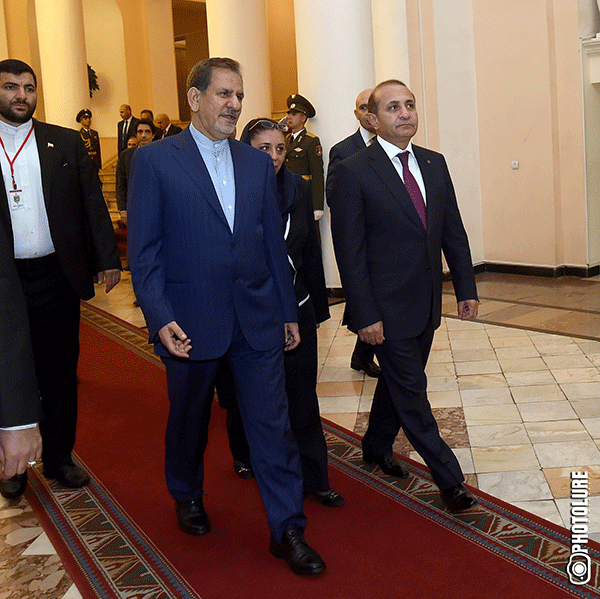“Parallel to easing the tension between Iran-West, Iran intensifies its policy vector with its neighbors, particularly with Armenia”, – said Narek Poghosyan, an expert in International law and politics, in the conversation with Aravot.am, referring to the visit of the delegation headed by the Iranian first Vice President Eshaq Jahangiri to Armenia, the meetings, agreements and the outcome of the Iran-Armenia business forum.
“Iran does not hide that it has serious ambitions to intensify its influence in the region and establishing a key transportation route. The Iranian side especially highlights the importance of the need for the establishment of a transport corridor from Iran-Armenia-Georgia to Bulgaria,” says the expert.
During the Iran’s First Vice President Eshaq Jahangiri’s visit to Armenia within the framework of the meetings with the leadership of Armenia, they touched upon this issue. The Iranian Transport Minister Ahmad Abbas Akhund, who was included in the staff of the Iranian delegation, in the conversation with one of the media, noted that they Armenia and Iran are working on the establishment of a transport corridors from the Persian Gulf to the Black Sea and from there to Bulgaria. “This is also important for Armenia as it does not have an access to the sea and can use this corridor to come to the Persian Sea. We can also use this corridor – the territories of Armenia and Georgia – to come out to the Black Sea,” said Abbas Akhund.
“It should be noted that the establishment of a transport corridor from the Persian Gulf to the Black Sea and from there to Bulgaria creates serious geopolitical shifts in the region. During the project implementation, the scale of gravity in the region will bend toward Iran and as a result, the Turkish-Azerbaijani factor will weaken, especially in the event when Turkey currently has many domestic problems, including the Kurdish issue. Iran will have the chance to use its full energy and industrial potential and, as a result, obtain a pivotal role in ensuring the feasibility of the corridor,” opines Narek Poghosyan.
According to him, on the other hand, Armenia will be able to throw off the bitter consequences of the blockade carried out by Turkey and Azerbaijan, in the event when the Turkish-Azerbaijani side does not spare effort and energy to leave Armenia out of the regional programs. “Armenia will have the opportunity to assume the role of a liaison for Iran to get to the Black Sea, at the same time to get to the Persian Gulf, and why not, also to the Indian Ocean, which creates a wide horizon for Armenia in terms of economy.”
The expert adds that at the same time, in the event of the establishment of the transport corridors, Georgia will also be able to establish links with the Persian Gulf, as well as to diversify the regional routes passing thru its territory and to reduce the impact of the Turkish and Azerbaijani sides on it. In addition, Iran, Armenia, Georgia and Bulgaria will be able to establish a common transit route and an economic environment, which will make the southern section of the new “Silk Road” going to China.
Our interlocutor points out that the building of Iran-Armenia railway is a priority for the establishment of the transport corridor connecting the Black Sea to the Persian Gulf, and talking about it, the Iranian Transport Minister Ahmad Abbas Akhund said, “Most of the railway construction work should be done in Armenia, we have assured the Armenian side that when the 1/3rd of the 3 billion dollar investment will be made, we will build the Iranian section of the railway.”
“It should be noted that the Chinese side has already begun to examine the appropriateness of the railway, and if it is estimated as profitable, then Beijing will finance the project estimated at 3.2 billion dollars. Armenian has a problem in this matter to work more consistently with all parties of the project, create conditions so that the other parties of the project, especially the Iranian side, will also present China the need for the construction of a railway under the implementation of the project. It is necessary to show China the feasibility and the benefits of building the railway with its full potential, especially when the Chinese side having an ambitious project to connect Europe to China by a transit route, sooner or later will have to participate in the implementation of these projects,” said our interlocutor, adding that the implementation of the project has obtained a practical significance, from which it is one step towards implementation.
Nelly GRIGORYAN



















































